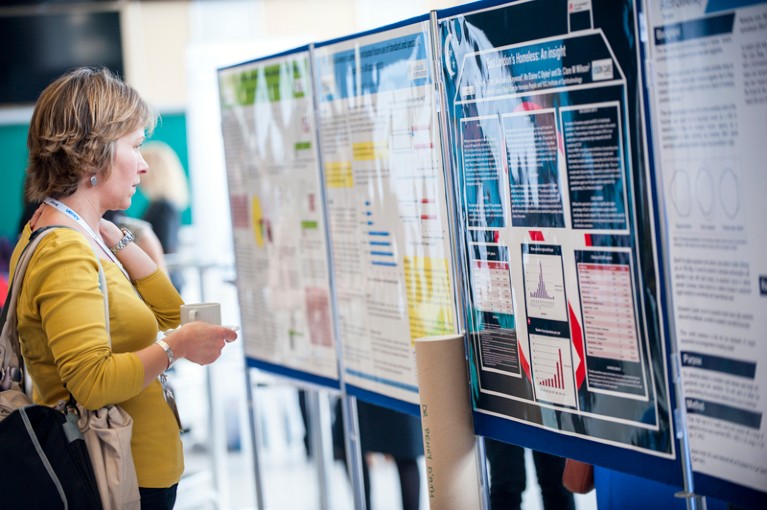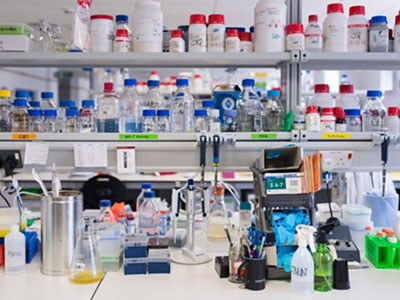
Innovation in PhD education has not reached how doctoral degrees are assessed.Credit: Dan Dunkley/Science Photo Library
Research and teaching in today’s universities are unrecognizable compared with what they were in the early nineteenth century, when Germany and later France gave the world the modern research doctorate. And yet significant aspects of the process of acquiring and assessing a doctorate have remained remarkably constant. A minimum of three years of independent study mentored by a single individual culminates in the production of the doctoral thesis — often a magisterial, book-length piece of work that is assessed in an oral examination by a few senior academic researchers. In an age in which there is much research-informed innovation in teaching and learning, the assessment of the doctoral thesis represents a curious throwback that is seemingly impervious to meaningful reform.
But reform is needed. Some doctoral candidates perceive the current assessment system to lack transparency, and examiners report concerns of falling standards (G. Houston A Study of the PhD Examination: Process, Attributes and Outcomes. PhD thesis, Oxford Univ.; 2018). Making the qualification more structured would help — and, equally importantly, would bring the assessment of PhD education in line with education across the board. PhD candidates with experience of modern assessment methods will become better researchers, wherever they work. Indeed, most will not be working in universities: the majority of PhD holders find employment outside academia.
Collection: Career resources for PhD students
It’s not that PhD training is completely stuck in the nineteenth century. Today’s doctoral candidates can choose from a range of pathways. Professional doctorates, often used in engineering, are jointly supervised by an employer and an academic, and are aimed at solving industry-based problems. Another innovation is PhD by publication, in which, instead of a final thesis on one or more research questions, the criterion for an award is a minimum number of papers published or accepted for publication. In some countries, doctoral students are increasingly being trained in cohorts, with the aim of providing a less isolating experience than that offered by the conventional supervisor–student relationship. PhD candidates are also encouraged to acquire transferable skills — for example, in data analysis, public engagement, project management or business, economics and finance. The value of such training would be even greater if these skills were to be formally assessed alongside a dissertation rather than seen as optional.
And yet, most PhDs are still assessed after the production of a final dissertation, according to a format that, at its core, has not changed for at least half a century, as speakers and delegates noted at an event in London last month on PhD assessment, organized by the Society for Research in Higher Education. Innovations in assessment that are common at other levels of education are struggling to find their way into the conventional doctoral programme.
Take the concept of learning objectives. Intended to aid consistency, fairness and transparency, learning objectives are a summary of what a student is expected to know and how they will be assessed, and are given at the start of a course of study. Part of the ambition is also to help tutors to keep track of their students’ learning and take remedial action before it is too late.
PhD training is no longer fit for purpose — it needs reform now
Formative assessment is another practice that has yet to find its way into PhD assessment consistently. Here, a tutor evaluates a student’s progress at the mid-point of a course and gives feedback or guidance on what students need to do to improve ahead of their final, or summative, assessment. It is not that these methods are absent from modern PhDs; a conscientious supervisor will not leave candidates to sink or swim until the last day. But at many institutions, such approaches are not required of PhD supervisors.
Part of the difficulty is that PhD training is carried out in research departments by people who do not need to have teaching qualifications or awareness of innovations based on education research. Supervisors shouldn’t just be experts in their field, they should also know how best to convey that subject knowledge — along with knowledge of research methods — to their students.
It is probably not possible for universities to require all doctoral supervisors to have teaching qualifications. But there are smaller changes that can be made. At a minimum, doctoral supervisors should take the time to engage with the research that exists in the field of PhD education, and how it can apply to their interactions with students.
There can be no one-size-fits-all solution to improving how a PhD is assessed, because different subjects often have bespoke needs and practices (P. Denicolo Qual. Assur. Educ. 11, 84–91; 2003). But supervisors and representatives of individual subject communities must continue to discuss what is most appropriate for their disciplines.
All things considered, there is benefit to adopting a more structured approach to PhD assessment. It is high time that PhD education caught up with changes that are now mainstream at most other levels of education. That must start with a closer partnership between education researchers, PhD supervisors and organizers of doctoral-training programmes in universities. This partnership will benefit everyone — PhD supervisors and doctoral students coming into the research workforce, whether in universities or elsewhere.
Education and training in research has entered many secondary schools, along with undergraduate teaching, which is a good thing. In the spirit of mutual learning, research doctoral supervisors, too, will benefit by going back to school.

 PhD training is no longer fit for purpose — it needs reform now
PhD training is no longer fit for purpose — it needs reform now
 Classroom assistance: the scientists turning the tools of their trade to education
Classroom assistance: the scientists turning the tools of their trade to education
 Collection: Career resources for PhD students
Collection: Career resources for PhD students




